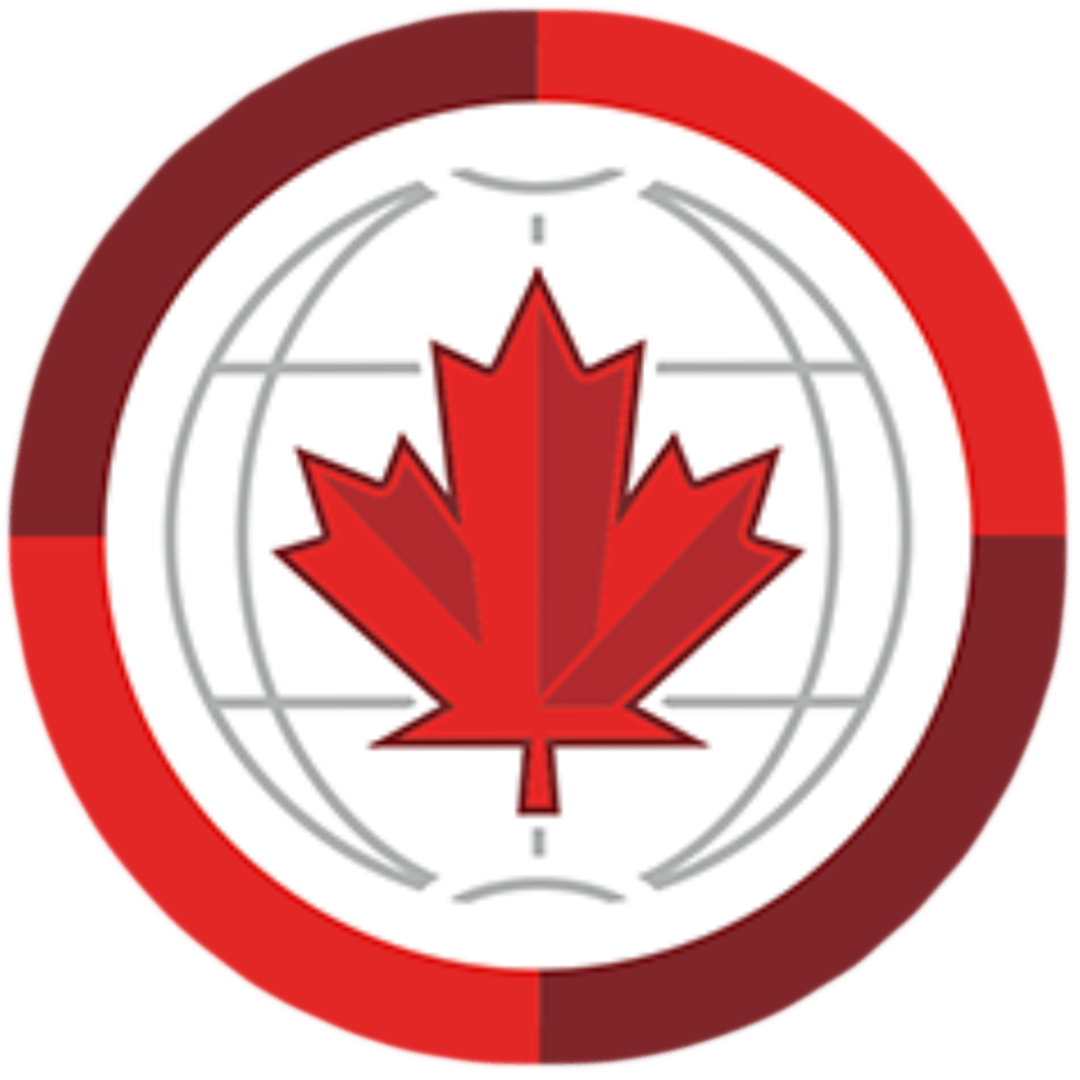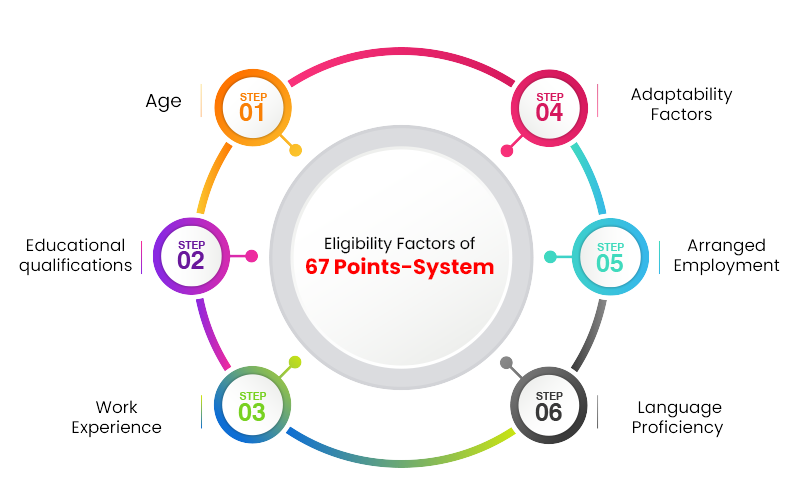
 GET FREE COUNSELLING
GET FREE COUNSELLING
67 Point Calculator : A Comprehensive Guide to Calculate Your PR Points
Canada is always in need of skilled immigrants to fill the gaps in the labour market. There are millions of immigrants who are willing to settle in Canada permanently. You can also apply to Permanent Residency(PR) through the Express Entry
pathway. It is one of the fastest pathways of Canadian immigration. You can check your eligibility for PR through the
What is a 67-point calculator?
The 67-point calculator is for the Federal Skilled Worker Program, which helps in determining ligibility for Permanent Residency. It is an essential tool for individuals willing to immigrate to Canada. To be eligible for the Federal Skilled Worker Program, you must score at least 67 points out of 100 based on the six main eligibility factors to enter the Express Entry pool.
You can calculate your score via 67 point calculator :
Eligibility Factors of Canada PR Points Calculator
To be eligible for the Federal Skilled Worker program, a minimum of 67 points out of 100 are required. The eligibility factors of 67 points- system are as follows -

1. Age - Age is one of the most important eligibility factors. The candidate can score a maximum of 12 points if they are between the ages of 18 and 35.
| Age | Points |
|---|---|
| Under 18 | 0 |
| 18-35 | 12 |
| 36 | 11 |
| 37 | 10 |
| 38 | 9 |
| 39 | 8 |
| 40 | 7 |
| 41 | 6 |
| 42 | 5 |
| 43 | 4 |
| 44 | 3 |
| 45 | 2 |
| 46 | 1 |
| 47 and older | 0 |
2. Educational qualifications - Your educational credentials are compared with the education of Canada and you are marked accordingly. For example - a PhD degree grants you 25 points and a Bachelors’ degree grants you 23 points.
| Level of Education | Points (25 max) |
|---|---|
| Doctoral (PhD) level | 25 |
| Master's level | 23 |
| Two or more post-secondary degrees - at least one for a program of at least 3 years | 22 |
| Post-secondary degree - 3 years or longer | 21 |
| Post-secondary degree - 2 years | 19 |
| Post-secondary degree - 1 year | 15 |
| Secondary school | 5 |
3. Work Experience - The candidate must have at least one year of relevant experience. Additionally, the job of the person should be listed in the NOC list (Skill 0, A or B). The maximum work experience score that you can obtain is 15. The person with more years of experience gets the preference and a higher score.
| Experience | Maximum points |
|---|---|
| 1 year | 9 |
| 2-3 years | 11 |
| 4-5 years | 13 |
| 6 or more years | 15 |
4. Language Proficiency - You would need to demonstrate your language skills in English and French. Exams such as IELTS (for English) and TEF (for French) are necessary for proving language proficiency.
| Proficiency – English | IELTS Score | Points (24 max) | |||
|---|---|---|---|---|---|
| First Official Language | Speaking | Listening | Reading | Writing | |
| CLB 9 | 7.0 | 8.0 | 7.0 | 7.0 | 6 pts/ability |
| CLB 8 | 6.5 | 7.5 | 6.5 | 6.5 | 5 pts/ability |
| CLB 7 | 6.0 | 6.0 | 6.0 | 6.0 | 4 pts/ability |
| Score must be met in all four abilities | 5.0 | 5.0 | 4.0 | 5.0 | 4 Points Maximum |
5. Arranged Employment - If you have a valid job offer from Canada, 10 points are awarded.
| Arranged Employment | Points |
|---|---|
| A job offer of at least 1 year from a Canadian employer. | 10 |
6. Adaptability Factors - 10 additional points can be awarded if-
- You have close relatives in Canada
- You or your spouse have past work experience in Canada
- You or your spouse have studied in Canada
- If your spouse has given a language test and scored a CLB score 4 or higher.
| Adaptability | Maximum 10 points |
|---|---|
| Your spouse or partner’s language level | 5 |
| Your past studies in Canada | 5 |
| Your spouse or partner’s past studies in Canada | 5 |
| Your past work in Canada | 10 |
| Your spouse or common-law partner’s past work in Canada | 5 |
| Arranged employment in Canada | 5 |
| Relatives in Canada | 5 |
Common Mistakes to Avoid while Calculating
It would be best to avoid these common mistakes while calculating your score using the 67-point system. These errors include misinterpreting the eligibility criteria or failing to provide accurate information. This would result in errors while calculating your score.
Most people misunderstand the point system criteria. It is crucial to read the list of criteria fully. This will provide a basic understanding of the requirements for each factor and the assessment procedure.
This will ensure that you calculate your score accurately and have a clear understanding of your eligibility for Canadian immigration.
Another most common mistake that potential immigrants do is to provide inaccurate personal and professional information.
It is essential to provide correct details regarding your age, education, language proficiency, work experience, and adaptability factors. If you provide false information, it can result in severe consequences such as disqualification.
Also, it is essential to keep yourself updated with the latest immigration policies and regulations in foreign countries. The Canadian government regularly updates its immigration programs and policies. If someone does not stay informed, it can lead to miscalculations and misunderstandings of the point system.
By being aware of these common mistakes and taking the necessary precautions, you can ensure an accurate calculation of your score and increase your chances of successfully immigrating to Canada.
Strategies to Improve your Eligibility Score
The higher your score, higher the chances of getting an invitation to apply for Permanent Residence (PR). Here are a few strategies to help you improve your score.
Make Strategies to Improve your Language Skills
The candidate should improve their language skills in order to improve your eligibility score under the 67 point system. You can register for language courses, practice with native speakers or hire our IELTS trainer. Our IELTS trainer has years of experience.
Gaining More Work Experience
If you gain more work experience, then your score would be better. It is an effective strategy for maximizing your eligibility score. You can work in high-demand occupations that meet the economic needs of Canada's market. In this way you can significantly increase your chances of meeting the necessary points required for Canadian immigration.
Enroll in Higher Education
Another effective method to boost your eligibility score is to pursue higher education. You can get advanced degrees or certifications that can earn you additional points under the 67 point system. This will make you a more favorable candidate for immigration to Canada.
Conclusion
In conclusion, the 67 points calculator is a critical tool for individuals considering Canadian immigration. Understanding how the system works and the factors that influence your score is important. You have to carefully calculate and improve your eligibility score, you can enhance your chances of successfully immigrating to Canada and starting a new chapter in your life.
Read these FAQs
Canada 67 Points Calculator Highlights
- Get 67 out of 100.
- Federal Skilled Workers Program (FSWP).
- Language score - 28 max.
- Education score - 25 max.
- Work experience score - 15 max.
- Age score - 12 max.
- Arranged employment - 10 max.
- Adaptability - 10 max.
The 67-Point Immigration to Canada Criteria
- Canada Express Entry Eligibility | 67 points on 6 factors.
- Age (Maximum 12 points).
- Language Ability (Maximum 28 Points).
- Education Qualification (Maximum 25 points).
- Work Experience (Maximum 15 points).
- Adaptability (Maximum 10 points).
- Arranged Employment (Maximum 10 points).
This CLB corresponds to 6 band scores per section i.e reading, writing, listening and speaking. Therefore we can say that a 6.5 band scale is a good score to get Canadian PR. But candidates aim for higher IELTS for higher CLB scores.
Minimum Points Required for Express Entry To be eligible to apply for a Canada PR under the Express Entry system, you will need a minimum score of 67 points out of 100 to qualify.
A student needs at least 6.0 bands in each of the four modules of Reading, Writing, Speaking and Listening, and an overall band score of 6.0 to get a Canada student visa.
Get quickest immigration & news updates
QUICK LINKS
FIND US
The Stark Visas - Best Immigration Consultants in India | Visa Services 1206-1208, 12th Floor, Ansal Tower, Nehru Place, New Delhi - 110019
Delhi Office
+91 8233-05-8233
info@starkvisas.com
1206-1208, 12th Floor, Ansal Tower, Nehru Place, New Delhi - 110019
Ahmedabad Office
+91 8233-05-8233
info@starkvisas.com
Office No. 307, B-Block 3rd Floor, Shreeya Atlanta Nr. Bhagban Party Plot Ahmedabad Gujarat 380054
